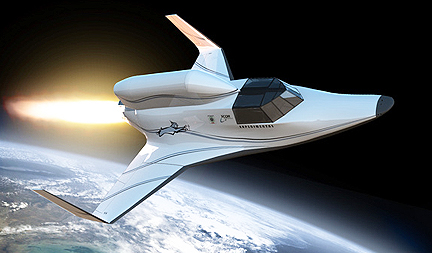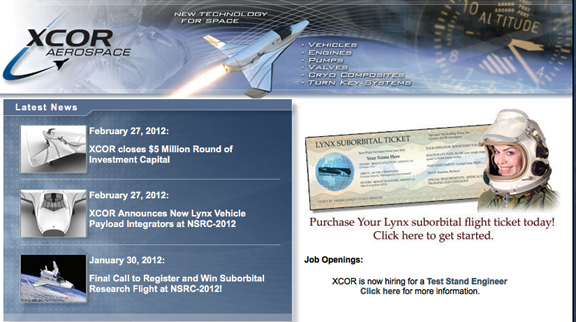The round, combined with cash on hand plus anticipated and existing contracts, should fund the company through production of its Lynx Mark I Suborbital vehicle. The financing included participation of new and previous investors. Among them are Esther Dyson, Pete Ricketts (co-owner of the Chicago Cubs) and several top Silicon Valley entrepreneurs and former venture capitalists.
"We have announced this important news at the Next Generation Suborbital Researchers Conference here in Silicon Valley because we believe the future of commercial space access will be driven by enterprise customers like the attendees here today," said Andrew Nelson, XCOR's Chief Operating Officer. He added, "This investment represents a vote of trust and confidence in the markets represented by NSRC participants." Jeff Greason, Founder and CEO of XCOR, said, "I believe we were able to raise funds in these trying economic times because XCOR has demonstrated compelling value to investors and customers. Our $60-plus Million backlog of orders for Lynx suborbital vehicles, flights on Lynx, and our unique reusable non-toxic rocket engines gives the investor community reason to take notice."
As part of this financing, XCOR is also happy to announce a reformulated Board of Directors. The directors include newcomer Esther Dyson, former venture capitalist Stephen Fleming, Chairman of the Space Studies Institute Dr. Lee Valentine, and company founders Jeff Greason and Dan DeLong. Ms Dyson is well known for her perceptive early investments in the Internet, software and social media industries, her service on private and public corporate boards and foundations, and for leading NASA's Technology and Innovation Advisory Council. Mr. Fleming is a former general partner at the venture capital firm of ATV Partners and is now Vice President at Georgia Tech where he leads the Enterprise Innovation Institute. Dr. Valentine is well known in the commercial space community for his leadership of the Space Studies Institute and his work with many early stage startup companies.
Work proceeds on the Lynx suborbital vehicle at XCOR. With the recent receipt of the Lynx Mark I fuselage, the continued testing of the liquid oxygen and kerosene propulsion system, the fielding of the non-toxic high performance bi-propellant reaction control system, and the recent release of request for quotes for the cockpit pressure vessel and wing strakes, XCOR is getting ever closer to first flight. XCOR Aerospace company information link.

Artistic rendition of XCOR Aerospace' Lynx suborbital vehicle.
The payload integrators will sell Lynx research flight services and assist in creating standardization in research hardware for the suborbital market. Each payload integration specialist firm will help facilitate and provision flight services on the Lynx by ensuring that end users understand the packaging, environmental, safety, operational flight profile(s) and interface (physical, electrical and data) requirements of the Lynx for both automated experiments not requiring user intervention during flight, and those experiments when the scientist accompanies the payload to the edge of space. The integrators will provide a variety of additional value added services depending on their individual service offering and customer needs, including, but not limited to fabrication, test and qualification of experiments for the Lynx environment.
XCOR will be responsible for: (1) developing and periodically updating the Lynx interface control document, payload user's guide and other payload related processes and procedures in consultation with the payload integration specialists, end customers and regulators; (2) operating an annual Lynx payload user's group conference to solicit feedback and promulgate best practices across the payload integrators network and user community; (3) addressing any specific non-standard needs identified by payload integration specialists and their customers such as special flight trajectories or unique vehicle integration needs; (4) any special licensing or regulatory actions pertaining to the flight; and (5) with the integration specialist and customer, performing a final safety and pre-flight review meeting before the mission is flown and a de-briefing of the mission after flight.


